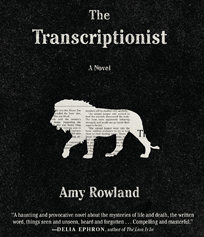Isolated on the 11th floor of the Record, a venerable New York newspaper in the midst of making the awkward transition to the digital age, Lena Respass, the title character of Amy Rowland’s novel The Transcriptionist, spends her days typing other people’s words. These words, the dictations of reporters for the Record, flow in through her ears and out through her fingers. They also invade her sleep. “She awakens in the morning with someone else’s words, someone else’s thoughts, ribboning around her brain . . . mixed in with the flotsam of dreams until she does not know anymore what is real.”
novel The Transcriptionist, spends her days typing other people’s words. These words, the dictations of reporters for the Record, flow in through her ears and out through her fingers. They also invade her sleep. “She awakens in the morning with someone else’s words, someone else’s thoughts, ribboning around her brain . . . mixed in with the flotsam of dreams until she does not know anymore what is real.”
The question of what words do to illuminate or obscure reality is Lena’s bete noire and the source of her social and professional reclusion. She knows that her analog job is an anachronism, that soon it will disappear before the inexorable advance of the digital age, just as info-tainment and profiteering are steadily eroding the idea of journalism as avatar of truth and protector of democracy (however much Howard, the Record’s publisher, wants to pretend otherwise). Her philological crisis of faith—she dropped out of a literature graduate program when she was “cured” of the naïve belief that language could save people—has left her in a soul-numbing retreat from the world. All she has left are quotations to fill the void where language should be the bridge. It’s the very definition of alienation.
This all begins to change when she comes across a story in the Record of a blind woman who apparently committed suicide by climbing the fence and swimming the moat in the lion exhibit at the Bronx Zoo, allowing herself to be mauled to death. When Lena sees the accompanying photo, she realizes she had met the woman just days before in a chance encounter on a bus. The dead woman, Arlene, had been a court reporter who, like Lena, transcribed stories of loss and conflict—other people’s stories, other people’s words. Lena reflects that “Arlene was not reporting, she was recording. She was transcribing exactly what other people were saying, all day, every day. It was a very difficult job, I mean not only the work, the concentration, the, well, submission to listening to people’s tragedies all day.”
Lena’s quest to understand what drove Arlene to such a strange and tragic end evolves into an urgent desire that Arlene, despite being buried in a potter’s field, not be erased from memory . What finally has to emerge for Lena to know what she must do, however, is a reckoning of the cost that an estrangement from words can exact upon the human psyche.
The Transciptionist is wry, tragic, moving, ironic, melancholy, funny, intelligent. And, in the end, hopeful. The writing is graceful, at times lyrical, and the melodic, subdued reading by Xe Sands perfectly captures these qualities. If you’re looking for a rewarding and thoughtful book club offering that will elicit a multifaceted discussion of the modern world and human condition, I highly recommend The Transciptionist.

No Comments so far ↓
There are no comments yet...Kick things off by filling out the form below.